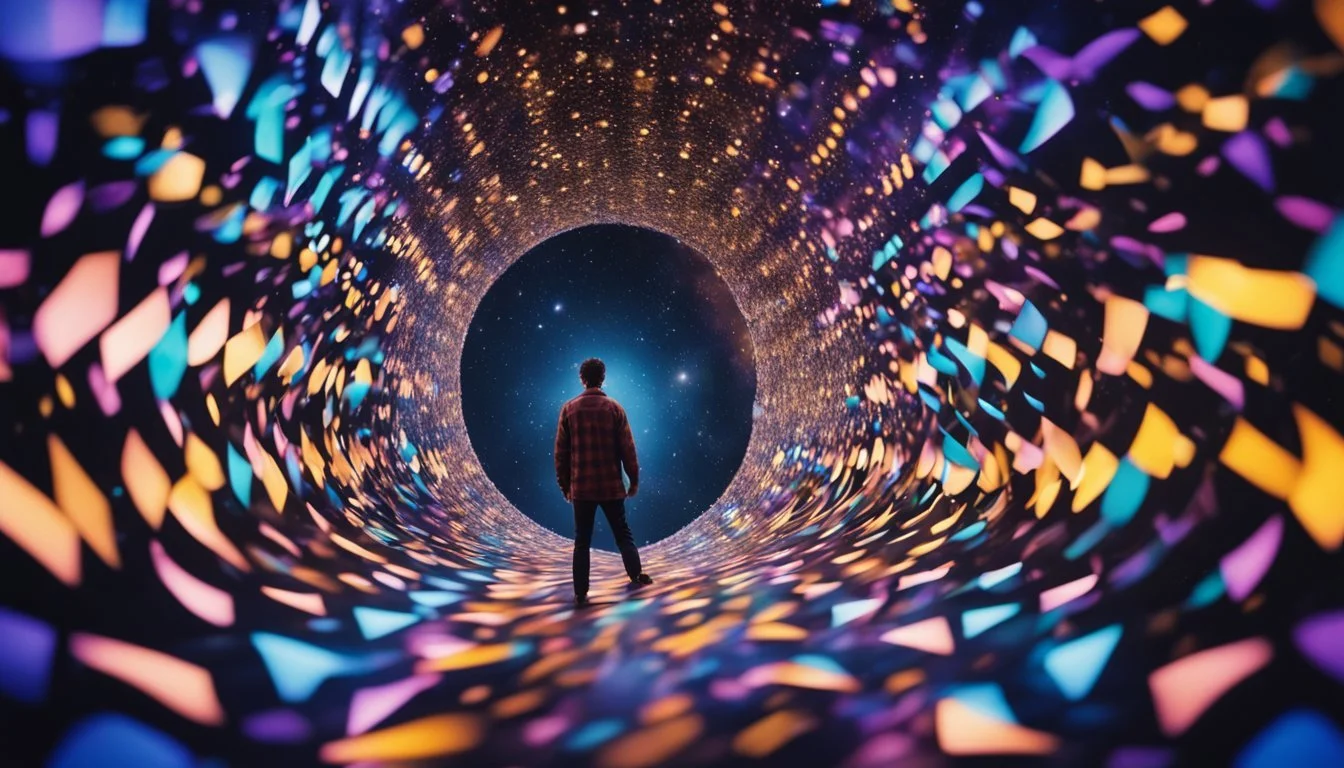9 Stories of Lucid Dreaming
Exploring the World of Dream Documentaries
Lucid dreaming documentaries open a window into a fascinating realm where boundaries of reality bend, offering viewers a unique perspective on the power of human consciousness. These films explore the interplay between dreams and reality, inviting audiences to reflect on the potential of lucid dreaming to enhance creativity and personal growth. By delving into the art and science of lucid dreaming, these documentaries inspire a deeper exploration of one's own dreams and subconscious mind.
Through compelling narratives and stunning visuals, these documentaries capture the imagination by revealing the intriguing possibilities that lucid dreaming presents. Both dreamers and skeptics alike may find themselves intrigued as they delve into the transformative experiences shared by those who master the art of lucid dreaming. By weaving together personal stories and expert insights, these films provide a thought-provoking journey into a largely untapped dimension of the human psyche.
1) "Exploring the World of Lucid Dreaming" by Stephen LaBerge
Stephen LaBerge's groundbreaking work, "Exploring the World of Lucid Dreaming," offers a comprehensive guide to understanding and practicing lucid dreaming. Drawing from LaBerge's extensive research at Stanford University, the book presents a structured framework for consciously influencing dream outcomes.
The book discusses various techniques to achieve lucidity in dreams, from reality testing to the use of mnemonic induction of lucid dreams (MILD). LaBerge provides valuable context by delving into the teachings of Tibetan dream yogis, offering readers a historical perspective.
LaBerge also addresses the ethical considerations of lucid dreaming. He encourages responsible exploration and respect for the unique environments within dreams. The book remains a significant resource for anyone interested in unlocking the potential of their dream life.
More about the book can be found on Wikipedia.
2) BBC's 'Through The Wormhole: Lucid Dreaming' (2011)
The BBC documentary segment on lucid dreaming from 'Through The Wormhole' delves into the fascinating world of dreams, offering viewers a guided exploration into consciousness. This program stands out for its detailed examination of how individuals become aware within their dreams and potentially manipulate their dreamscapes.
'Through The Wormhole' features insightful interviews with experts who analyze the complexities of lucid dreaming. They provide an understanding of the possible benefits and challenges associated with this phenomenon. Researchers share methods that may help individuals achieve lucidity in their dreams.
The segment effectively uses a blend of scientific analysis and personal stories to illustrate the range of experiences people have during lucid dreams. This dual approach helps demystify the concept, making it more accessible to a broader audience. It invites viewers to reflect on their own dreaming experiences.
For those interested in understanding how our brain processes dreams and awareness, BBC's portrayal offers a valuable resource. The documentary provides content that engages both skeptics and enthusiasts, encouraging deeper exploration of the dreaming mind.
More information on the series can be found on IMDb.
3) 'Dreams: Cinema of the Subconscious' by Inception (2010)
"Dreams: Cinema of the Subconscious" serves as a captivating companion piece to Christopher Nolan's film Inception. It explores the fascinating world of lucid dreaming and its portrayal in the movie. Produced alongside the 2010 blockbuster, this documentary delves into the intersection of neuroscience and filmmaking.
Joseph Gordon-Levitt hosts the documentary, guiding viewers through insights shared by prominent scientists and dream experts. They discuss the possibilities of living within and controlling dreams, shedding light on the subconscious mind.
The film examines how dreams can operate like a parallel reality, mirroring themes depicted in Inception. Viewers gain new perspectives on the concept of dream layers and the ability to manipulate dreams consciously.
This documentary offers thought-provoking content for those intrigued by the brain's capacity to imagine and shape reality. It invites audiences to question the boundaries between dreams and the waking world. With a runtime of 147 minutes, viewers are taken on an engaging journey into the depths of the mind.
More details about the film can be found at IMDb.
4) 'Waking Life' by Richard Linklater (2001)
Richard Linklater's film "Waking Life" (2001) offers an exploration of lucid dreaming and philosophical queries. The movie is renowned for its unique rotoscope animation style, which enhances its dream-like quality.
The narrative follows a young man navigating a series of interconnected dreams. He engages with diverse characters, each presenting different philosophical ideas and perspectives.
The film immerses viewers in discussions surrounding reality, consciousness, and existentialism. It's a meditative journey that reflects on the line between waking life and dreams.
Linklater's work provokes thought on free will and the essence of human existence. The film's philosophical undertones challenge the audience to reflect on their own lives.
For more information, visit the Wikipedia page for "Waking Life".
5) "Going Out of Your Mind: An Introduction to Dream Lucidity"
"Going Out of Your Mind: An Introduction to Dream Lucidity" (1989) offers a foundational exploration into lucid dreaming. This documentary seeks to demystify the phenomenon, illustrating both theoretical and practical aspects. It introduces viewers to key techniques that can potentially assist in achieving consciousness within dreams.
Through interviews with experts and those experienced in dream lucidity, the film provides insights into why this practice intrigues many. Discussions include personal anecdotes from individuals who have successfully controlled their dreamscapes.
The documentary also aligns dream lucidity with scientific perspectives, examining its potential benefits on mental health and creativity. Interested audiences are encouraged to delve into lucid dreaming themselves with essential methods covered by real-life practitioners.
For those intrigued by the intersection of science and the subconscious, this documentary stands as an engaging introduction. More about this film can be found on IMDb.
6) 'Beyond Dreaming: Exploring Lucid Dreams' by National Geographic (2023)
National Geographic's exploration of lucid dreaming sheds light on the fascinating intersection of science and spirituality. Released in 2023, this documentary investigates the phenomenon where dreamers become conscious within their dreams.
The film features Michael Sheehy, a noted scholar of Tibetan Buddhism. He discusses the impact of lucid dreaming on cognitive abilities such as flexibility and imagination, which shows a unique blend of academic insight and personal experience.
Another intriguing aspect is the inclusion of scientific advancements. The documentary touches on the development of devices that could enhance the experience of lucid dreaming, providing viewers with a glimpse of future possibilities in understanding consciousness.
For those interested in how lucid dreaming can influence daily life and perception, this film offers valuable perspectives. It combines scientific research with cultural practices, creating a comprehensive view of lucid dreams.
7) 'The Lucid Dreamer' - PBS Documentary (2014)
'The Lucid Dreamer' delves into the realm of lucid dreaming with a focus on the experiences and insights of Charlie Morley, a dedicated Buddhist and seasoned teacher. The documentary examines how individuals can achieve awareness during deep sleep, potentially unlocking deeper layers of consciousness.
Viewers are guided through the core concepts of lucid dreaming, exploring distinctions between regular and lucid dreams. The film emphasizes benefits such as heightened self-awareness, boosted creativity, and enhanced problem-solving abilities. Morley's methods and teachings offer practical applications for those seeking to integrate lucid dreaming into their personal practices.
The exploration in 'The Lucid Dreamer' provides an in-depth look at potential spiritual and psychological benefits. By documenting the experiences of Morley and other practitioners, the documentary illustrates the transformative power of lucid dreaming.
For more information, visit IMDb.
8) 'Discovering Lucid Dreams' on Netflix
'Discovering Lucid Dreams' on Netflix provides an intriguing exploration into the world where dreamers are aware they are dreaming and can sometimes influence the narrative. This series delves into the various techniques used to achieve and retain lucid dreams, offering viewers a comprehensive look at the potential of conscious dreaming.
The use of scientific insights alongside personal stories helps illuminate the phenomenon of lucid dreaming. Interviews with dream experts and enthusiasts guide the audience through the complexities and benefits of achieving such states. Through diverse perspectives, the series paints a compelling picture of a practice once reserved for mystics.
Visually captivating and intellectually engaging, the documentary succeeds in both educating and inspiring viewers. It opens up discussions on topics such as the impact of lucid dreaming on creativity and its therapeutic uses in managing anxiety and trauma. The series is suitable for both skeptics and believers alike, providing ample content for thought and discussion.
For more information, visit IMDB and discover other interesting facets of dream-related content available on the platform.
9) 'The Dreaming Brain' by NOVA (2024)
'The Dreaming Brain' by NOVA explores the mysterious world of dreams with a focus on how they occur and what influences them. This documentary delves into the scientific aspects of dreaming, featuring insights from neuroscientists and psychologists who study the brain's activities during sleep.
The documentary highlights the occurrence of lucid dreaming, discussing its unique characteristics and how it differs from regular dreaming. Viewers learn about the brain's role in creating this state of consciousness, along with the types of brainwaves associated with becoming lucid.
Experts in the documentary discuss the potential benefits of lucid dreaming. These include enhanced creativity and insight, as well as the possibility of improving problem-solving skills while asleep. The documentary provides a platform for these experts to share empirical evidence and personal narratives.
'The Dreaming Brain' offers an engaging and informative perspective on dreams, making it a suitable resource for those curious about the connection between dreaming and brain function. The documentary is a contribution to the broader understanding of why humans dream and what can be learned from the process.
Find more about 'The Dreaming Brain' on Wikipedia.
Understanding Lucid Dreaming
Lucid dreaming allows individuals to become aware that they are dreaming within their dreams. This awareness enables dreamers to influence and actively engage with their dream environment. Scientific research sheds light on how these experiences occur, while psychological studies reveal the benefits to mental health.
Scientific Perspectives
The exploration into lucid dreaming from a scientific standpoint gained momentum in the latter part of the 20th century. Researchers highlight that lucid dreaming typically happens during the REM (Rapid Eye Movement) phase of sleep. The prefrontal cortex, responsible for self-awareness and decision-making, remains more active than usual during these states, enabling a dreamer to realize they are dreaming.
Electroencephalogram (EEG) studies have shown distinct patterns of brain activity, marking the difference between lucid and non-lucid dreams. Eye movement signals during REM sleep demonstrate how dreamers communicate with researchers while dreaming lucidly. This discovery validated the phenomenon, providing measurable data and proving that the experience is more than mere anecdote.
Psychological Benefits
Lucid dreaming offers several psychological advantages that can enhance personal well-being and mental health. Engaging in lucid dreams can lead to increased creativity, and many practitioners report a boost in problem-solving skills. This mental clarity arises because the dream state allows for a departure from typical constraints, promoting unique thought patterns.
Another significant benefit includes enhanced self-awareness. With practice, dreamers can confront fears or process emotions, leading to potential reductions in anxiety. Some studies suggest that lucid dreaming can improve wakeful cognitive skills, offering frequent practitioners a more adaptive approach to life's challenges. This conscious journey through one's dream life offers unique healing and growth opportunities.
Cultural Significance of Lucid Dreaming
Lucid dreaming serves as a culturally rich phenomenon, shaping spiritual practices and cross-cultural understandings across various traditions. Its historical roots are linked to ancient spiritual practices, while modern interpretations focus on psychological benefits and self-exploration.
Historical Context
Lucid dreaming has deep historical roots, intertwining with spiritual practices in numerous cultures.
In Eastern traditions, it often connects with meditation or yoga, viewed as a bridge to the spiritual realm. Buddhism and Hinduism integrate this practice for greater awareness and enlightenment. Islamic cultures highlight dreams' power in communication with the divine, fostering spiritual growth.
Historically, many believed dreams held prophetic powers, as seen in ancient Greek and Egyptian civilizations. These societies valued dreams for insights from gods or universal truths. Such historical significance underscores how diverse cultures have long revered dreams for guidance and self-discovery.
Modern Interpretations
Today, lucid dreaming enjoys a resurgence, often tied to psychological and creative aspects.
Psychologists emphasize its role in enhancing creativity, problem-solving, and self-awareness. This modern view shifts the focus from purely spiritual exploration to tangible personal benefits. Documentaries and analyses highlight practices for achieving lucid dreams to harness these psychological advantages.
In contemporary culture, lucid dreaming appears in various media, boosting public curiosity. It is often framed as a tool for self-improvement and personal insight, resonating with those seeking greater control over their subconscious experiences. This modern approach reflects a synthesis of ancient wisdom with scientific exploration, illustrating how lucid dreaming remains a vibrant area of interest today.








